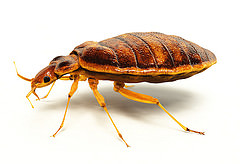Bed Bugs and Fleas and Ticks! Goodbye
 Insect bites are unpleasant and often painfully itchy. Even worse, they may lead to infection or spread dangerous diseases. Here is a guide to three common biting insects -- bed bugs, fleas, and ticks -- and practical pest control steps you should take for each kind.
Insect bites are unpleasant and often painfully itchy. Even worse, they may lead to infection or spread dangerous diseases. Here is a guide to three common biting insects -- bed bugs, fleas, and ticks -- and practical pest control steps you should take for each kind.
Bed Bugs: The Problem
In May of 2014, The New York Post reported that numbers of bed bug infestations had declined sharply over the past several years, due to increased public awareness of the problem. This is good news indeed. However, the key word is "declined"; there were still 520 bed bug violations reported in multi-family dwellings over the 2013 fiscal year.
Bed bugs live on human blood. In return, they leave behind small itchy red bumps on their victim's body, which are easily confused with mosquito bites. Telltale clues to the presence of bed bugs are bites that appear in a line on the skin, as well as droppings (tiny brown or black specks) or clusters of whitish larvae on your sheets. In addition, you may spot the bugs themselves, which are wingless, as big as apple seeds, and reddish-brown in color.
Bed bug treatment
Cleanse bed bug bites with soapy water; minimize your risk of infection by resisting the urge to scratch. Avoid bringing home secondhand mattresses or upholstered furniture unless it is from a scrupulously reliable source. Check the beds before staying at a hotel. At home, keep your bedroom clean and uncluttered to minimize bed bug hiding spots. Change your sheets at least once weekly. Vacuum both your bedroom floor and your mattress.
Fleas: The Problem
Although most people think that where there are fleas, there must be a dog somewhere in the picture, that's not necessarily true. These minuscule insect annoyances may hitchhike into your home aboard a either a beloved cat -- yours or the neighbor's -- or an animal pest like a mouse or rat. In fact, if you've recently moved into a new home, a welcoming committee may have already been there, just waiting to greet you -- a colony of flea eggs ensconced in the carpet or upholstery.
Fleas are difficult to spot due to their small size, ultra-thin bodies, and dark-brown-to-black color (until they move, when their characteristic hopping motion will give them away). Despite their pinhead-sized stature, fleas can make both pets and humans very, very miserable. Flea bites are intensely itchy. If you are unable to resist the overwhelming urge to scratch, you're very likely to contract a secondary infection. Some fleas spread other infestations such as tapeworms or even dangerous diseases like bubonic plague.
Flea treatment
Until you get the fleas out of your house, wear long pants tucked into socks to prevent bites. Then vacuum, vacuum, vacuum. You want to catch those insect pests, together with their larvae, and close them into a bag that you can neatly dispose of, right in the trash. Ask your veterinarian for a safe oral or topical treatment to get rid of fleas living on your household pets. Wash Midnight or Muffin's bedding and machine dry at a high temperature. Ensure that wild animals have no access to your home.
Ticks: The Problem
The normal habitat of ticks is outdoors, but they can be carried into your home via an animal, most probably a dog. When they have finished a good meal of their favorite food -- blood -- ticks will drop off their host and seek out hiding places, perhaps behind baseboards or inside furniture.
If you become a tick's evening meal, the bitten site may not itch or hurt at all. Don't discount the consequences of a bite, though. Ticks are notorious as frequent carriers of Lyme disease or Rocky Mountain Spotted Fever, depending on their species.
Tick treatment
Once again, cleanliness is the key to getting rid of these insect pests. Your home as well as any animal kennels that may be infested should be thoroughly scrubbed, with special attention to pets' bedding. Treat your dog with a vet-approved topical medication. There are sprays manufactured to combat ticks outdoors, but the best course of action is management -- keeping grass and foliage your yard well-trimmed and eliminating sources of excessive moisture.
For serious infestation by any of these annoying insects, find a reliable pest control professional.
Laura Firszt writes for networx.com.
Updated March 28, 2018.
Looking for a Pro? Call us (866) 441-6648

Pest control Average Costs
Exterminators Experiences

The Best Pest Control Service For My New Florida Home

Mouse Control Got Rid Of A Small But Pesky Problem



